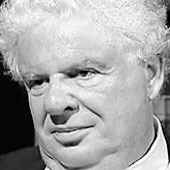A Transatlantic Reversal of Fortune
Is America's optimistic spirit of renewal more likely to reassert itself in Brussels than in Washington?
October 25, 2011
What a difference self-confidence makes. In March 1933, in the worst economic crisis that the American people have ever known, President Franklin D. Roosevelt in his first inaugural address rousingly asserted, “We have nothing to fear but fear itself.”
“This nation,” the 32nd President of the United States declared, “wants action, and action now.”
Yet 78 years later, a very different spirit prevails in Washington. It has lost the spirits of courage, boldness and what Merle Miller, in his admiring profile of President Harry Truman, called “plain speaking.”
Instead, the political cultures of both conservative Republican and liberal Democratic Washington have ossified into rigid, automatically antagonistic mindsets. National politics in the United States has degenerated into a series of Pavlovian responses undertaken by armies of opposing, unquestioning, mindlessly obedient courtiers.
Judged from this perspective, the crisis over the euro in Europe, while obviously appallingly serious, is not necessarily as frightening. For total psychological and emotional gridlock has not yet set in among Europe’s leaders and policymakers the way it has irrevocably settled on Washington.
Even today, European leaders such as Angela Merkel in Germany and Nicholas Sarkozy in France are mindful of Europe’s disastrous history and understand the gift of being able to remake things. So is Britain’s remarkably bold and innovative prime minister, David Cameron.
Merkel, Sarkozy, Cameron and the leaders of the European Commission in Brussels certainly face very long odds. And they encounter disbelief from the dominant force in the global economic system, the established opinion shapers and policymakers centered in Washington and New York. These latter-day nattering nabobs of negativism adamantly disbelieve that the great European experiment — a reinvention toward a post-sovereignty construct between states — is even remotely possible.
But the arrogant negativism towards the EU that has been so long expressed from so many circles in Washington and New York generated an entirely false sense of security on the home front — so much so that it has now produced an unanticipated blowback. Republicans and Democrats across the United States are now deadlocked in unending confrontation about their own financial affairs and future.
The potential resources of the United States and its 310 million people remain vast, effectively limitless. Yet the U.S. government has recently lost its crucial AAA international credit rating with Standard and Poor’s. Why? Because the Democratic administration and the Republican majority in the House of Representatives, in a singular act of willful self-immolation, have been unable to compromise on a responsible and credible fiscal package.
By contrast, for all the strains that Greece is inflicting on the euro, the political and moral will of the leaders of Germany, France and Britain to preserve the economic stability and financial viability of their respective national economies is not in doubt. All of them have imposed on their own national economies sweeping cuts that neither Republicans nor Democrats have dared to contemplate in the United States. The governments of Spain and Ireland have shown equal determination and courage.
No such luck with the U.S. federal government. Both Presidents George W. Bush and Barack Obama so far have failed entirely to do that. Such confidence has never been lower in the 150 years since the secession of the Confederate Southern states and the start of the U.S. Civil War.
The existential crisis of confidence in America is running far deeper than the one in Europe. Obsessing about the future and very nature of the federal government has become a major factor weighing on the American mind today.
Governor Rick Perry of Texas, a leading contender for the 2012 Republican presidential nomination, has been attacked for hypothetically mentioning the possibility that some states might someday consider seceding from the U.S. federal union. That speaks neither of self-confidence nor of generosity or relaxedness — all attributes that Americans have typically claimed for themselves.
Indeed, when one considers the political debates surrounding the crises in America and Europe, it now increasingly appears that the roles between innovative and statist actors have reversed.
And note that all this negativism and unconstructive stance coming from U.S. shores and flowing toward Europe is a violation of the most beautiful element of the American character — optimism, as well as that closely related virtue, generosity, in the sense of wishing others around you no less success than yourself.
General Douglas MacArthur famously told a Joint Session of the U.S. Congress in 1951 that the unprecedented dangers of a deeply divided, nuclear armed world had to be mastered — and that they could be. But, MacArthur continued, positive attitudes of mind had to precede political and economic solutions. They were the essential precondition for it.
“It must be of the spirit,” MacArthur said,” if we are to save the flesh.”
That same principle applies in the capitals of 21st century Europe and America — but it may arise in the Old World before it does in the New.
Takeaways
Total psychological and emotional gridlock has not yet set in among Europe's leaders and policymakers the way it has irrevocably settled on Washington.
When one considers the political debates surrounding the crises in America and Europe, it now appears that the roles between innovative and statist actors have reversed.
For all the strains that Greece is inflicting on the euro, the political and moral will of the leaders of Germany, France and Britain is not in doubt.
Read previous
Who Was the Richest Person Ever?
October 21, 2011
